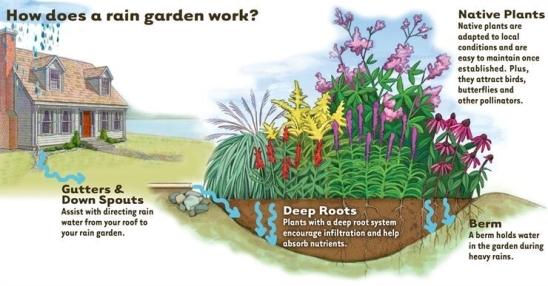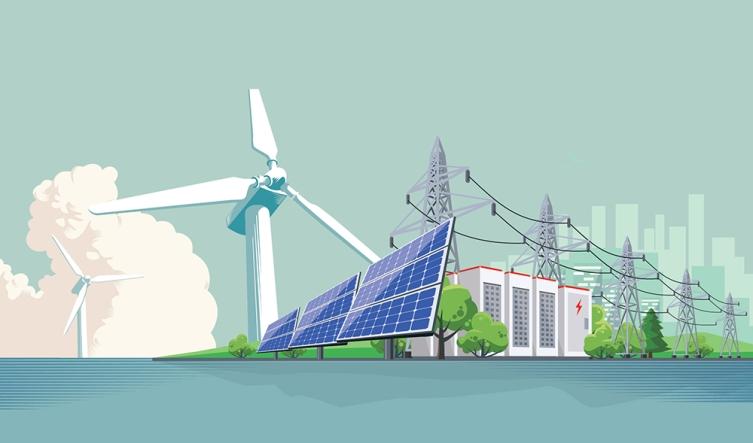
7 minute read
Environmental Advisory Council
Monitoring Stream Water Salinity in Crabby Creek with Sunrise Berwyn
By Jonathan Wilson, EAC Salinization, or an increase in salt concentration in freshwater streams, is an environmental problem that can be amplified by human activity. In most streams, there are two sources of salts: natural weathering from rocks and soils, and salts used for surface de-icing that have washed into waterways during rainstorms and spring thaw. Recent scientific research has shown that the use of rock salt for winter surface de-icing has measurably increased river salinity over the last several decades, particularly in streams that flow through urban and suburban areas. High salt concentrations cause physiological stress to organisms in freshwater streams: they can reduce the number and size of invertebrates, which are important food for fish, and, consequently, the many organisms that feed on fish. If salt concentrations rise high enough, salinity in freshwater streams can even affect fish and amphibian populations directly.
Advertisement
In order to monitor the health of critical habitats in the Township, such as Valley Creek, representatives from the Environmental Advisory Council (EAC) have been working with activists from Sunrise Berwyn to monitor salinity concentrations in Crabby Creek, an important tributary of Trout Creek and Valley Creek and, therefore, the Schuylkill River. Throughout February and March, volunteers have been sampling water at regular intervals to track the amount of salt that is introduced to Trout and Valley Creeks through the Crabby Creek watershed. Led by Sunrise Berwyn's Sofia Khugaeva and Keira Celebuski, volunteers monitored salinity in Crabby Creek before, during, and after this year's snowpack melted.
Preliminary results suggest that Crabby Creek's watershed may be contributing to the elevated salinity observed in Valley Creek. Salinity has been higher
Photo of Crabby Creek in March by Anne
in Crabby Creek than values reported from other streams, both before and after the spring thaw in March. Future work will help determine whether the source of this elevated salinity is within the bedrock and soil of the watershed, or if its source is ultimately de-icing salt. These findings will help us identify problem areas and choose strategies to improve water quality throughout the Township. Residents can support this project in two ways:
If you live in the watershed and would like to help, use salt for de-icing sparingly or only when necessary. Rely on the sun to melt snow or use alternative, stream-safe materials, such as dark sand or ashes.
If you would like to volunteer to collect additional data next fall, winter, and spring, please contact the TE Green Team at TEGreenTeam@gmail.com.
New Raingarden Program Coming To Tredyffrin
by Kristen McCann The Township is in the beginning phases of introducing a raingarden program to help with excessive stormwater and related damages, keep our groundwater healthy, and reduce pollution in our rivers and streams. Stormwater has become one of the greatest challenges the Township faces and the most financially damaging local effect of climate change.
The US EPA estimates that pollutants carried by rainwater runoff account for 70% of all water pollution. Compared to a conventional lawn, rain gardens allow for 30% more water to soak into the ground, drastically reducing the amount of polluted water that flows directly into our rivers and streams. They filter out 80-90% of the sediment and chemicals, resulting in more groundwater and healthier groundwater. They also provide food and shelter for butterflies, songbirds and other wildlife.

This program is a collaboration between the Environmental Advisory Council and the TE Green Team and will largely install raingardens on private property. Properties will be assessed by local volunteers to ensure the garden location meets the necessary criteria. Installation will be handled entirely by local volunteers. Residents who receive a raingarden on their property will be required to volunteer hours to the program and will be required to maintain the garden for a period of many years. Raingardens will be funded by various grants, fundraisers and donations, as well as a per garden fee paid by the resident on a sliding scale. Residents who are interested in receiving a raingarden or volunteering can get more information by emailing TredyffrinRaingardens@gmail.com.
by Rutger Boerema and Jennifer Cox, EAC
Following the signing of a Clean Energy Resolution by the Board of Supervisors in September 2018, which aspires to move the Township away from fossil fuel dependency toward renewable energy for daily activities such as driving, and heating & cooling our homes, the Township has taken several steps. The Environmental Advisory Council is currently writing a clean energy transition plan, outlining actions the Township and community can take to support this transition. The plan will also set a baseline for reducing fossil fuel emissions in Township buildings, fleet, and wider residential and business community. In an effort to gain insight and support from local townships and boroughs with similar clean energy goals, a team of EAC members and Township staff have joined a consortium of 16 local townships and boroughs aiming to transition to renewable energy. Beginning at the end of the summer of 2020, the Tredyffrin team, along with other municipal teams from the consortium, attended a series of workshops designed to walk municipalities through the sequence of steps for creating a renewable energy transition plan.
In the meantime, the Township has taken several actions to reduce its greenhouse gas emissions. They joined the Delaware Valley Regional Planning Commission's (DVRPC) Streetlight Procurement Project in 2018, installed an electric vehicle charging station at the Tredyffrin Township Library,
Making Solar More Accessible - Township Awarded Bronze Designation by the Department of Energy SolSmart Program
by Rutger Boerema and Jennifer Cox, EAC
ndOn Earth Day, April 22 , 2019, Liz Compitello, Manager of Local Initiatives for the DVRCP, was invited by the EAC to present a summary of the national SolSmart program to the Board of Supervisors, explaining how Tredyffrin Township could participate in the program. Solsmart was launched in 2016 and aims to help communities reduce barriers to solar installations. It is funded by the U.S. Department of Energy Solar Energy Technologies Office. To start the process, the Township signed a Solar Statement announcing its intention to achieve SolSmart designation. This first step enabled Tredyffrin to receive free technical assistance from a partnering organization, Cadmus, and begin working toward achieving a bronze designation. SolSmart has three levels of designation: bronze, silver, and gold. Municipalities can move through these designations, beginning with bronze, as they continue to reduce barriers and streamline the solar installation process for residents and installers.
To attain SolSmart bronze status, Tredyffrin was required to show that it has an online process to request a solar permit for small PV rooftop solar in the area of permitting. This online permitting process is in place and can be found here on the Township website under Building and Construction Permits. Click on Residential Permit Application Requirement. Another area of focus was the requirement to review zoning requirements as written in replaced existing police vehicles, as they age out, with hybrid vehicles, and participates in the SolSmart program (see below). Recently, the Township switched to a 100% renewable electricity provider beginning at the end of its current contract in January 2022.
The Township strives to educate and encourage residents to transition to clean energy by serving as a model and a resource for the wider community. When complete, the Tredyffrin Renewable Energy Transition Plan will be available on the Township website. We look forward to sharing key points from the plan with the Tredyffrin community in future newsletters and on the EAC webpage.
Chapter 181 Subdivision and Land Development (SALDO) of the Township code. Cadmus performed the review and highlighted areas in which the Township can improve the ordinance. Even though the code defines solar energy, there are no definitions of solar energy devices, such as PV solar for electricity generation or solar water heating systems. The code also does not specify which zoning districts allow or do not allow solar. This review showed that more clarification in the SALDO would be a helpful step to move forward.
Having completed these tasks and achieved the SolSmart bronze designation, the Township will continue working to improve the solar application process in the future and plans to achieve the SolSmart silver designation. This aligns with recommendations which were made in the 2021 Comprehensive Plan.







